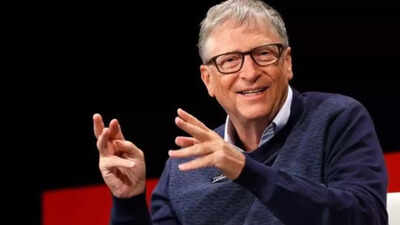ARTICLE AD BOX

Microsoft co-founder Bill Gates believes that a combination of global investment and technological breakthroughs, including AI, has the potential to save millions of children's lives. In a blog post, Gates highlighted that global child mortality has already been cut in half over the past 25 years, a "stunning achievement", he says most people don't realise happened. However, Gates warns that "the story's not over yet," as funding for global health is currently shrinking despite the acceleration of new scientific innovations. He has also urged governments to invest in global health to ensure that discoveries, like AI-aided sensors that help mothers and babies survive childbirth to reach the people who need them most.
Read what Bill Gates wrote about global child mortality being reduced by half
In a statement shared on The Time magazine, Gates wrote: “One of humanity’s most stunning achievements is something most people don’t even realise happened.In 2000, more than 10 million children died before they reached their fifth birthday. Today, it’s less than 5 million. The world cut child mortality in half in just 25 years. It’s an amazing success story. But the story’s not over yet. In fact, right now, the next chapter is being written as governments around the world set their budgets. And global leaders have a once-in-a-generation chance to do something extraordinary. Countries around the world have the expertise to solve major health problems—but they need the tools, medicines, and vaccines to make it happen. That’s what global health institutions like the Global Fund and Gavi were designed to do: help countries make smarter and more cost-effective decisions. I believe that opportunity shouldn’t be an accident of birth, and where you live shouldn’t determine if you live. I’ve announced that I’m giving away virtually all my wealth to support this effort over the next 20 years, because this is a critical moment for progress. But the fact remains: we won’t get there without rich countries giving a small fraction of their budgets to help the world’s poorest people and save millions of lives.That’s where government decisions come in. Of course, budget deliberations are difficult. Many of the countries that have given the most health aid in the past face high debt levels, aging populations, and domestic challenges.I’m not naive. I don’t expect most governments to suddenly restore foreign aid to historic levels.But I am an optimist.Because while things may seem dire right now, two things can be true at once: what’s happening to the health of the world’s children is worse than most people realise, and our long-term prospects are better than most people can imagine.That’s the paradox of this moment: funding for global health is shrinking. But science is accelerating—and people are determined to make sure innovations reach children who need them, no matter where they happen to be born.The choices we make today will determine what the world looks like for the next generation. I’m a grandfather now, so this hits even closer to home. I want my grandkids to grow up in a world where kids know what diseases like HIV, polio, and sickle cell anaemia were, but don’t know anyone who has them.A world where malaria wards are empty—because no child is at risk of the disease. A world where everyone survives childbirth—and childhood. That’s the future every child deserves. And we can all play a part in building it.I’m talking to leaders about how to do more with less. That includes focusing on core lifesaving programs, doubling down on innovations that can eradicate and cure diseases, not just manage them, and laying a pathway out of our outdated, donor-recipient model of global aid toward a sustainable model where countries are self-sufficient.But none of that can happen if donor countries don’t invest in the health of all people, especially children. Take the Global Fund. It’s probably the most effective lifesaving initiative of the 21st century: since 2002, it’s saved 70 million lives from AIDS, tuberculosis, and malaria. At the Global Fund replenishment in November, we’ll see just how high of a priority this is for countries. Our foundation will announce our contribution next week, and I’ll be interested to see what governments bring to the table. Low-income countries can also do more to prioritise the health of their citizens. Many poorer countries spend less than 3% of their domestic budgets on health. In many cases, it is not because they don’t want to spend more—it’s because they face crippling debt burdens and interest repayments. Global financial institutions must relieve the burden of debt so that low-income countries can free up resources to invest more in the health of their people.Yes, humanity is at a crossroads. But I’m betting on humanity because no challenge is greater than the power of people working together to solve it. Every day, I’m inspired by people I meet, like Dr Opeyemi Akinajo, who is working on AI-aided sensors that can help more moms and babies survive childbirth. Or Indonesia’s health minister, Budi Sadikin, who’s working tirelessly to ensure children have access to the health care they need to get the best possible start at life.I’m inspired by stories closer to home, too—like Maddie and Emile Leeflang, teenagers from Utah who were moved by their volunteer work in Kenya to advocate for health aid. In every corner of the world, there are good people dedicated to making a difference.Will we be there for them? Will countries ensure their budgets support the health of the world’s children? Will we ensure new breakthroughs reach the people who need them most? The answers are entirely within our control.”
iPhone 17 Pro Max: The Price Is Insane, But the Tech Is Better



.png)
.png)
.png)
















 1 hour ago
4
1 hour ago
4









 English (US) ·
English (US) ·